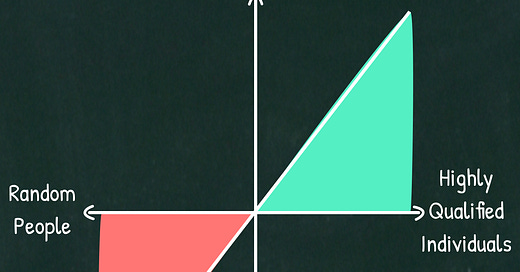
Discover more from 📙 Little Almanack
Hey Friend!
Today I bring you a super insightful and complete chapter from Nassim’s book Fooled by Randomness. It has an idea rooted in the Socratic way of thinking, and if you apply it to your life it will guarantee you 2 benefits:
Help you to reduce the “noise” (nonsense information) in your life so you can actually focus on the “signals” (valuable information).
Help you stabilize your emotional state—become more Stoic.
👤 Author
💡Nugget
🟠 Nassim Nicholas Taleb:
Excerpt from his book → Fooled by Randomness
WITTGENSTEIN’S RULER
What is the mechanism that should convince authors to avoid reading comments on their work, except for those they solicit from specified persons for whom they have intellectual respect? The mechanism is a probabilistic method called conditional information: Unless the source of the statement has extremely high qualifications, the statement will be more revealing of the author than the information intended by him.
This applies, of course, to matters of judgment. A book review, good or bad, can be far more descriptive of the reviewer than informational about the book itself.
This mechanism I also call Wittgenstein’s ruler: Unless you have confidence in the ruler’s reliability, if you use a ruler to measure a table you may also be using the table to measure the ruler. The less you trust the ruler‘s reliability (in probability called the prior), the more information you are getting about the ruler and the less about the table.
The point extends way beyond information and probability. This conditionality of information is central in epistemology, probability, even in studies of consciousness.
The point carries practical implications: The information from an anonymous reader on Amazon.com is all about the person, while that of a qualified person, is going to be all about the book. This plays equally in court: Take the O. J. Simpson trial once again. One of the jurors said, “There was not enough blood,” meaning to assess the statistical evidence of what was offered: Such statement reveals very little about the statistical evidence as compared with what it shows about the author of the statement’s ability to make a valid inference. Had the juror been a forensic expert, the ratio of information would have tilted the other way.
The problem is that while such reasoning is central to my thinking, my brain knows it though not my heart: My emotional system does not understand Wittgenstein’s ruler. I can offer the following evidence: A compliment is always pleasant, regardless of its authorship—something manipulators know rather well. Likewise with book reviews or comments on my risk-management strategy.
This idea of only caring about arguments that come from a qualified / experienced person aligns with Socrate's view that one should not care about what the majority thinks, instead one should only care about statements from people with a thorough reasoning.
And of course, in a complex and highly specialized world, only qualified and experienced people (in whatever the domain) will have that thorough reasoning which is worth paying attention.
By the way, I recently wrote an essay (with the editing help of Brian David Crane) where I discussed this same idea under the more broadly topic of contrasting "true opinions" with knowledge. You can read the full essay clicking here.📁 All the ideas in this article are saved and classified in a searchable Database, which (as of July 2024) contains nearly 2,000 timeless ideas (sourced directly from the most influential doers and entrepreneurs — captured on books, interviews/podcasts and articles).
I call this Database the Doers Notebook, and I’ve recently opened it for anyone who wants it.
🤔 Why did I build this?
Well, as the Latin motto goes, “A chief part of learning is simply knowing where you can find a thing.” And since it’s all 🔎 searchable, we only need to type a keyword to immediately get a list of insights related to it!
For instance, if I’m unsure about how to get more sales in my business, I can simply type the word “sales” and immediately get 88 search results! In this case from Jim Edwards, Peter Thiel, Naval Ravikant, Paul Graham, Sam Altman, Balaji Srinivasan, Nassim Taleb, and many other remarkable individuals.
It’s like having a 🧠 second brain from which we can pull wisdom on demand.
And this is super valuable because it can significantly decrease the error rate in our judgment.
“In an age of infinite leverage [code and media], judgment is the most important skill.”
- Naval Ravikant
I actually made a video where I went through the list of insights I got for the keywords “sales” and “creative”.
So, if you wanna get better at sales and learn to be more creative (and also see all the features of the database and how you can get access) then definitely check out the video 👇
💥 Stuff I Loved
First person that came to mind when I read this tweet → Warren Buffet. A truly sophisticated mind who adopted a simplified lifestyle.
(Highlight resurfaced on my Readwise)
Some of my favorite highlights from this interview:
[Noah Kagan]: This is something that's counterintuitive in businesses: If there's not fighting, you're not really getting the best ideas. I want more people saying “no”. The best people at Facebook when I was there were always saying no to Mark. I was always like, "Yeah, Mark, that was a pretty good idea." That's maybe why I got fired... But over time I've realized that challenging respectfully is very healthy.
This emphasize the importance of seeking truth, rather than conformity. In Startups that become successful this is usually the case — there is a truth seeking culture. Because to survive, you need the truth and to see the unfiltered feedback from the market. But in bureaucratic firms, and especially in organizations that do not have direct feedback from the market (e.g./ Most NGOs, The International Monetary Fund, Departments of Social Sciences...), their survival do not depend on truth. So they rely on conformity since its the most comfortable and "human" thing to do. I actually made a video about this idea, featuring Nassim Taleb and Naval Ravikant - Click here to watch the video.[Tim Ferriss]: I really want to step back and see if I am in a position where I'm uniquely differentiated, or have some type of competitive advantage.
Not because I care about competition per se, but it's like: “Am I in a red ocean that used to be a blue ocean? Or am I developing practices that are going to lead me to a point of not just uniformity with others but… are we all running towards a cliff, like a bunch of lemmings?”
The term "Red Ocean" refers to intense competition. Whereas the term "Blue Ocean" refers to a market with no competition.
Wishing you a great weekend :)
Julio xx
P.S. If you liked this article, you'll definitely enjoy my free 80-page ebook. It’s packed with 23 big ideas (from top influential doers and entrepreneurs) to become better, richer and wiser. Download your copy here!


















Valuable nuggets in this post Julio!
"If I would have ask people for better transportation they would have replied faster horses not cars" -Henry Ford (ig)
Taking feedback from consumers involves the signal of demand.
Not of the product or innovation. If consumers were smart then they'd be creators.
And I think the graph would be better if you would show it in 2 different 1st quadrants, i got boggled wondering where the negative points came from until I realised that its a quadrant of different graph itself.